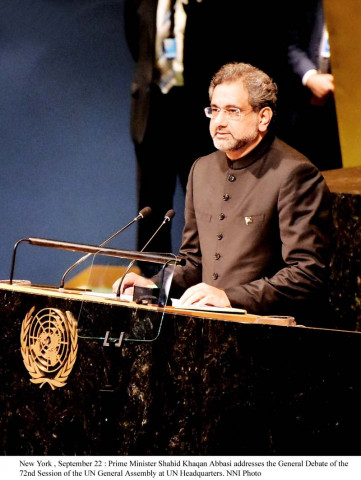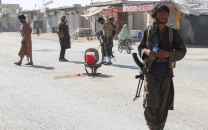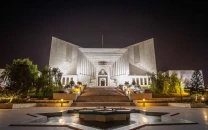Analysis: Abbasi’s speech throws Delhi off balance
Unsavoury reaction shows India has been stung by PM’s forceful address, say analysts

PM Shahid Khaqan Abbasi addressing UNGA session PHOTO:NNI
Stung by scathing criticism, India exercised its ‘right of reply’ to make a repugnant retort, calling Pakistan ‘Terror-istan.’ This shows Abbasi’s forceful speech has thrown Delhi off-balance, according to analysts and Foreign Office officials.
Abbasi’s address came against the backdrop of simmering tensions between the two nuclear arch-rivals. So much so that when the prime minister was rehearsing his speech at the UN General Assembly, Indian border guards shelled civilian population in Pakistan, killing six people.
Wide-ranging UN address: PM tells India to stop sponsoring terror, come to talks
Since his ascension to power, Prime Minister Narendra Modi has been doing all he can to isolate Pakistan diplomatically by branding it a state sponsoring terrorism.
The PML-N government has long been criticised by its rivals for going soft on India despite Modi’s relentless slur campaign against Pakistan. Abbasi’s predecessor Nawaz Sharif had been particularly targeted for not publicly saying enough against India’s policy of destabilising Pakistan.
Against the backdrop, Abbasi had a challenge not only to satisfy critics at home but also deliver a speech that must help counter the Indian narrative.
Though his speech covered many issues ranging from climate change to nuclear non-proliferation and from Palestine to Rohingya Muslims, his focus was tensions with India and Afghanistan imbroglio.
In a clear departure from earlier position, Premier Abbasi minced no words in publicly naming India for being behind a “campaign of subversion and state-sponsored terrorism against Pakistan, including from across our western border”.
Shahid Khaqan Abbasi's attire at the UN meetings states a lot
Sharif did make a reference to ‘externally sponsored’ terrorism in his address to the UN General Assembly last year but stopped short of explicitly naming India.
Pakistan’s former ambassador to the US Ashraf Jahangir Qazi says Abbasi’s speech reflects Pakistan’s position that India is sponsoring terrorism. “I don’t think it has anything to do with the change of prime minister,” Qazi told The Express Tribune.
He recalled that it was during Sharif’s tenure when Pakistan submitted dossiers to the UN secretary general cataloging evidence of Indian secret agencies’ involvement in fomenting violence in Pakistan.
However, some observers believe Abassi was more forthcoming as compared to his predecessor, who had often been accused by opposition parties for going soft on India because of his ‘personal ties’ with Modi.
Sharif was a strong proponent of normalising ties with India.
Apart from other factors, many people believe Modi’s ‘hostile policies’ had made it difficult for Sharif to pursue rapprochement as public support for such an approach had fast dwindled.
India’s reign of terror in Kashmir had compelled Sharif to declare Bhurhan Wani a ‘martyr’, something that drew strong condemnation from India.
Afghan President Ghani urges dialogue with Pakistan at UNGA
On the Kashmir dispute, Abbasi mostly repeated what Sharif had said in his speech last year. The incumbent prime minister demanded the international investigation into ‘India’s crimes in Kashmir.’
“We ask that the UN Secretary General and the High Commissioner for Human Rights send an inquiry Commission to Occupied Kashmir to verify the nature and extent of India’s human rights violations, secure the punishment of those responsible and provide justice and relief to the victims,” Abbasi said in his UN speech.
The premier also drew the world’s attention towards the current tensions along the Line of Control and Working boundary.
“To divert the world’s attention from its brutalities; India frequently violates the ceasefire along the Line of Control in Kashmir. Despite over 600 violations since January this year Pakistan has acted with restraint. “But if India does venture across the LoC, or acts upon its doctrine of ‘limited’ war against Pakistan, it will evoke a strong and matching response,” he added.
He cautioned that the international community must act decisively to prevent the situation from a dangerous escalation.
“If it would not have made any difference, then why would India give such a stinging reply to the PM speech,” said a Foreign Office official, when asked if Abbasi’s attempt to raise the Kashmir dispute could make any difference.
Former ambassador Qazi endorsed the view. The international community, particularly the West, was aware of the situation in Kashmir. They may not be criticising India publicly because of ‘political expediency’ but privately they must have been confronting New Delhi, he added.
Analysts and former diplomats also applauded Abbasi for putting up a strong defense of Pakistan’s achievements in the fight against terrorism and at the same time reminding the world that it could not be made ‘scapegoat’ for the failures in Afghanistan.
However, they believe a mere speech at the UN General Assembly cannot make a huge difference as there still exists a huge gap between what Pakistan says and how the world, particularly the West, perceives us.



















COMMENTS
Comments are moderated and generally will be posted if they are on-topic and not abusive.
For more information, please see our Comments FAQ